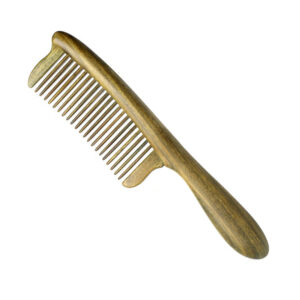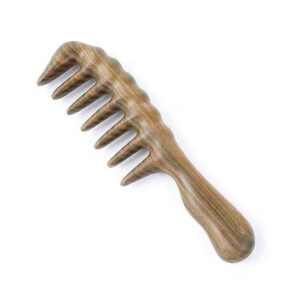Last updated on April 2nd, 2025 at 07:02 am

With the increasing pace of modern life and stress, more and more people are concerned about their health and appearance, and hair health has become the center of attention for many people. However, many people face hair loss, thinning hair, scalp problems, and other troubles. And, probiotics, as a microorganism widely recognized for its health benefits, has long shown its potential benefits in terms of digestive health, immune boosting, and more. But, do probiotics help with hair growth?
What are probiotics?
Probiotics, as the name suggests, are active microorganisms beneficial to the human body. As defined by the World Health Organization (WHO) and the World Food and Agriculture Organization (FAO), probiotics are live bacteria that, when ingested in appropriate amounts, can have a beneficial effect on the host’s health. These microorganisms are found primarily in the human gut but also play a role in other parts of the body such as the oral and reproductive tracts.
There are many different types of probiotics, including the following:
- Lactobacillus species: Such as Lactobacillus and Lactobacillus acidophilus, these flora can help digest lactose and alleviate lactose intolerance, as well as produce vitamin B complex and vitamin K.
- Bifidobacteria: Such as Bifidobacterium longum and Bifidobacterium shortum, these flora help maintain the balance of intestinal microorganisms and enhance immunity.
- Gram-positive cocci: Such as Streptococcus faecalis and Lactococcus lactis, etc. These flora can help digestion and absorption and produce short-chain fatty acids, which help to lower intestinal pH and inhibit the growth of harmful bacteria.
The role of probiotics in the human body is multifaceted. They not only help improve digestive health but also enhance the function of the immune system, lower cholesterol and improve cardiovascular health. In addition, probiotics can help synthesize and absorb certain vitamins and minerals, positively affecting overall health.
Do probiotics help with hair growth?
First of all, probiotics can affect the microenvironment of the scalp by regulating the balance of gut microbes. The scalp is the foundation of hair growth and its health is directly related to the quality of hair growth. Probiotics can help reduce harmful bacteria on the scalp, such as Malassezia, whose overgrowth can lead to dandruff and scalp inflammation, which can affect normal hair growth.
Secondly, probiotics promote the absorption of nutrients and provide the necessary nutritional support for hair growth. Hair growth requires a variety of nutrients, including protein, vitamins, and minerals. Probiotics can help break down the complex nutrients in food so that they can be more easily absorbed by the body, thus providing sufficient nutrients for hair growth.
Finally, probiotics can also affect hair growth by regulating the immune and endocrine systems. Immune system disorders and endocrine disorders can lead to hair loss or poor hair growth, and probiotics can help maintain these balances, thereby promoting healthy hair growth.
Probiotics produce positive effects on hair growth
1. Improve scalp environment and reduce dandruff and oils
Dandruff and excess oil are common signs of environmental problems in the scalp. Dandruff not only affects your appearance, but it can also be a sign of scalp health problems such as seborrheic dermatitis or fungal scalp infections. Excessive oil production, on the other hand, may lead to clogged pores, affecting the health of hair follicles and hair growth.
Probiotics improve the scalp environment through the following mechanisms:
- Inhibiting harmful bacteria: Probiotics can competitively inhibit the growth of harmful bacteria and reduce the bacterial load on the scalp, thus reducing dandruff.
- Regulating oil secretion: Probiotics may reduce oil secretion by regulating the activity of sebaceous glands, maintaining the balance of scalp oil.
- Reduce inflammation: Probiotics may reduce inflammation of the scalp, relieving itching and redness caused by an inflamed scalp, and these inflammatory states may promote the formation of dandruff.
- Enhances skin barrier function: Probiotics can help to enhance the barrier function of the scalp and reduce dandruff by reducing external irritants to the scalp.
Through these effects, probiotics help maintain a healthy balance of the scalp and provide a favorable environment for hair growth.
2. Promote the growth and division of hair follicle cells
2.1. Enhances nutrient supply
Probiotics can help break down complex nutrients in food, such as proteins and fibers, into more absorbable forms. As a result, hair follicle cells have access to a more adequate supply of nutrients to support their growth and division.
2.2. Regulates hormone levels
Probiotics may affect hormone levels by regulating metabolites produced by gut microbes, which include androgens and estrogens that are closely linked to hair growth. For example, probiotics may help reduce levels of the androgen DHT (dihydrotestosterone), excessive levels of which have been linked to male pattern baldness.
2.3. Improve blood circulation to the scalp
Probiotics may help improve blood circulation to the scalp and increase blood supply to the hair follicles. Good blood circulation brings in more oxygen and nutrients to promote the growth and division of hair follicle cells.
2.4. Regulates the cell cycle
Metabolites produced by probiotics may affect the cycle of hair follicle cells, promoting them to move from the resting phase to the growing phase. This regulatory effect helps to maintain a normal anagen cycle and reduce hair loss and breakage.
3. Improve nutrient absorption and utilization
3.1. Synthesizes B vitamins
Probiotics can help synthesize B vitamins, such as biotin (vitamin B7), which is essential for healthy hair growth. Insufficient biotin may lead to brittle hair and hair loss.
3.2. Improve mineral absorption
Probiotics can help the body better absorb minerals such as iron, zinc, and calcium, which are essential for hair growth and maintaining health. Zinc, for example, is vital for maintaining scalp health and follicle function.
3.3. Regulates intestinal flora balance
By regulating the balance of intestinal flora, probiotics can reduce competition for nutrients from harmful bacteria, ensuring that the body can efficiently absorb the nutrients it needs.
Enhance intestinal function
Probiotics can enhance the intestinal barrier function, reduce nutrient loss, and prevent harmful substances from entering the body, thus improving the efficiency of nutrient utilization.
Selection and use of probiotic supplements
When choosing and using probiotic supplements, you need to pay attention to the following aspects to ensure safety and effectiveness:
Choosing regular products: When purchasing, you should choose reputable brands and manufacturers to ensure that the products are genuine products purchased through regular channels. Check whether the product’s packaging is intact and has a clear production date and expiration date.
Check the type and number of strains: High-quality probiotic supplements will be clearly labeled with the type and number of strains contained. Products containing multiple strains should be chosen because different strains have different functions and a combination of strains can provide more comprehensive health benefits.
Number of live bacteria: The effectiveness of a probiotic is related to the number of live bacteria it contains. The usual recommended dose contains at least 1 billion to 10 billion live bacteria (CFU) per dose. Several live bacteria that are too low may not be enough to produce significant results.
Consider acid resistance: Choose products that are resistant to stomach acid and bile so that the probiotics can safely reach the gut and do their job.
Selection of dosage form: Probiotic supplements are available in a variety of dosage forms, such as capsules, powders, liquids, and so on. The appropriate dosage form should be chosen according to personal preference and specific conditions. For example, capsule form is convenient to carry and take, while powder form may be more suitable for people who need personalized dosage.
Usage: Follow product instructions or doctor’s advice for use. In general, probiotics should be taken before or during meals to minimize the effect of stomach acid on the live bacteria.
Continuous use: It may take some time for the effects of probiotics to become apparent, so continuous use for some time, usually at least 4 weeks, is recommended.
Precautions: If you experience any discomfort or reaction while using probiotic supplements, discontinue use and consult a physician. Pregnant women, nursing mothers, people with compromised immune systems, or those taking specific medications should consult a doctor before using probiotics.
Conclusion
Probiotics, as a potential hair growth aid, may have a positive impact on healthy hair growth by improving the scalp environment, promoting follicle cell growth and division, and improving nutrient absorption and utilization in several ways.
Sandalwood combs are equally effective in promoting hair growth, can you believe it?


